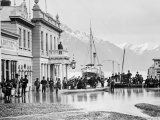1207 – Rumi, Persian mystic and poet, was born (d. 1273).
1399 Henry IV was proclaimed King of England.
1744 France and Spain defeated the Kingdom of Sardinia at the Battle of Madonna dell’Olmo.
1791 The Magic Flute, the last opera composed by Mozart, premiered at Freihaus-Theater auf der Wieden in Vienna.
1791 The National Constituent Assembly in Paris was dissolved; Parisians hailed Maximilien Robespierre and Jérôme Pétion as incorruptible patriots.
1813 Battle of Bárbula: Simón Bolívar defeated Santiago Bobadilla.
1832 Ann Maria Reeves Jarvis, American labour activist, was born (d. 1905).
1860 Britain’s first tram service begins in Birkenhead, Merseyside.
1861 – William Wrigley, Jr., American businessman, founded Wrigley Company, was born (d. 1932).
1878 – The ‘Great Flood’ of 1878 killed at least three people and thousands of animals as it swept across the southern South Island.

1882 The world’s first commercial hydroelectric power plant (later known as Appleton Edison Light Company) began operation on the Fox River in Appleton, Wisconsin.
1888 Jack the Ripper killed his third and fourth victims, Elizabeth Strideand Catherine Eddowes.
1895 Madagascar became a French protectorate.
1901 Hubert Cecil Booth patented the vacuum cleaner.
1903 The new Gresham’s School was officially opened by Field Marshal Sir Evelyn Wood.
1904 – Waldo Williams, Welsh poet and academic, was born (d. 1971).
1906 The Real Academia Galega, Galician language’s biggest linguistic authority, started working in Havana.
1921 Scottish actress Deborah Kerr was born (d 2007).
1924 US author Truman Capote was born (d. 1984).
1927 Babe Ruth became the first baseball player to hit 60 home runs in a season.
1931 Start of “Die Voortrekkers” youth movement for Afrikaners in Bloemfontein.
1932 – Anthony Hawkins, English-Australian actor, was born (d. 2013).
1933 – Barbara Knox, English actress, was born.
1935 The Hoover Dam, was dedicated.
1935 US singer Johnny Mathis was born.
1938 Britain, France, Germany and Italy signed the Munich Agreement, allowing Germany to occupy the Sudetenland region of Czechoslovakia.
1938 The League of Nations unanimously outlawed “intentional bombings of civilian populations”.
1939 General Władysław Sikorski became commander-in-chief of the Polish Government in exile.
1943 Marilyn McCoo, American singer (The 5th Dimension), was born.
1943 Ian Ogilvy, British Actor, was born.
1945 The Bourne End rail crash, in Hertfordshire killed 43 people.
1949 The Berlin Airlift ended.
1951 – Barry Marshall, Australian physician and academic, Nobel Prize laureate, was born.
1954 The U.S. Navy submarine USS Nautilus was commissioned as the world’s first nuclear reactor powered vessel.
1955 Film icon James Dean died in a road accident aged 24.
1957 US actress Fran Drescher was born.
1962 Mexican-American labour leader César Chávez founded the United Farm Workers.
1962 James Meredith entered the University of Mississippi, defying segregation.
1965 General Suharto took power after an alleged coup by theCommunist Party of Indonesia. In response, Suharto and his army massacred over a million Indonesians suspected of being communists.
1965 The Lockheed L-100, the civilian version of the C-130 Hercules, was introduced.
1966 The British protectorate of Bechuanaland declared its independence, and became the Republic of Botswana. Seretse Khamatook office as the first President.
1967 BBC Radio 1 was launched and Tony Blackburn presented its first show; the BBC’s other national radio stations also adopted numeric names.
1968 The Boeing 747 was shown to the public for the first time at the Boeing Everett Factory.
1970 Jordan made a deal with the Popular Front for the Liberation of Palestine (PFLP) for the release of the remaining hostages from theDawson’s Field hijackings.
1972 – The new Christchurch Town Hall opened.

1975 The Hughes (later McDonnell-Douglas, now Boeing) AH-64 Apache made its first flight.
1977 Philippine political prisoners, Eugenio Lopez, Jr. and Sergio Osmeña III escaped from Fort Bonifacio Maximum Security Prison.
1979 The Hong Kong MTR commenced service with the opening of its Modified Initial System (aka. Kwun Tong Line).
1980 Ethernet specifications were published by Xerox working with Intel and Digital Equipment Corporation.
1982 Cyanide-laced Tylenol killed six people in the Chicago area.
1986 Martin Guptill, New Zealand cricketer, was born.
1986 Mordechai Vanunu, who revealed details of Israel covert nuclear program to British media, was kidnapped in Rome.
1989 Foreign Minister of West Germany Hans-Dietrich Genscher‘s speech from the balcony of the German embassy in Prague.
1990 The Dalai Lama unveiled the Canadian Tribute to Human Rights in Ottawa.
1991 President Jean-Bertrand Aristide of Haiti was forced from office.
1993 An earthquake hit India‘s Latur and Osmanabad district of Marathwada (Au rangabad division) leaving tens of thousands of people dead and many more homeless.
1994 Aldwych tube station (originally Strand Station) of the London Underground closed after eighty-eight years of service.
1999 Japan’s worst nuclear accident at a uranium reprocessing facility inTōkai-mura, northeast of Tokyo.
2004 The first images of a live giant squid in its natural habitat were taken 600 miles south of Tokyo.
2004 – The AIM-54 Phoenix, the primary missile for the F-14 Tomcat, was retired from service.
2005 – The controversial drawings of Muhammad were printed in the Danish newspaper Jyllands-Posten.
2006 the National Assembly of the Republic of Serbia adopted the Constitutional Act that proclaimed the new Constitution of Serbia.
2009 – The 2009 Sumatra earthquakes killed more than 1,115 people.
2016 – Hurricane Matthew became a Category 5 hurricane, making it the strongest hurricane to form in the Caribbean Sea, since Hurricane Felix in 2007.
2016 – Two paintings by Vincent Van Gogh with a combined value of $100 million, Seascape at Scheveningen and Congregation Leaving the Reformed Church in Nuenen, were recovered after having been stolen on December 7, 2002 from the Van Gogh Museum in Amsterdam.
2017 – Titus Zeman, a Slovak Roman Catholic priest, was beatified by Pope Francis in Bratislava.
Sourced from NZ History Online & Wikipedia



 Posted by homepaddock
Posted by homepaddock 






